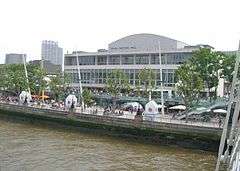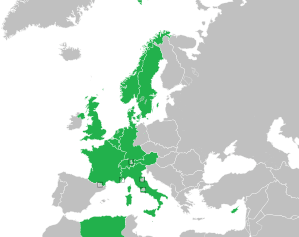Eurovision Song Contest 1960
| Eurovision Song Contest 1960 | ||||
|---|---|---|---|---|
| | ||||
| Dates | ||||
| Final | 29 March 1960 | |||
| Host | ||||
| Venue | Royal Festival Hall London, United Kingdom | |||
| Presenter(s) | Katie Boyle | |||
| Conductor | Eric Robinson | |||
| Director | Innes Lloyd | |||
| Host broadcaster | British Broadcasting Corporation (BBC) | |||
| Interval act | Eric Robinson's Orchestra[1] | |||
| Participants | ||||
| Number of entries | 13 | |||
| Debuting countries |
| |||
| Returning countries |
| |||
| Withdrawing countries | None | |||
| Participation map
| ||||
| Vote | ||||
| Voting system | Each country had 10 jury members who each awarded 1 point to their favourite song | |||
| Nul points | None | |||
| Winning song | "Tom Pillibi" | |||
| Eurovision Song Contest | ||||
| ||||
The Eurovision Song Contest 1960 was the fifth edition of the Eurovision Song Contest. It was held on Tuesday 29 March 1960 in London. Although the Netherlands had won the contest in 1959, the Netherlands Television Foundation declined to host another contest so soon after staging the event in 1958. The honour of hosting the contest therefore passed to the United Kingdom, which had come second in 1959. Therefore, the BBC chose Catherine Boyle (as she was then known) to be the mistress of ceremonies at the contest for the first time. France's win this year was their second in the contest.[1] The contest was won by France with the song "Tom Pillibi", performed by Jacqueline Boyer.
Location

The 1960 Eurovision Song Contest was hosted in London. The Royal Festival Hall, the venue for the 1960 contest, is a 2,900-seat concert, dance and talks venue within Southbank Centre in London. It is situated on the South Bank of the River Thames, not far from Hungerford Bridge.[2]
The result was a win for France, however Germany, Monaco and the UK led in the early stages of voting. The UK came second with 25 points, four more points than the winning song in 1959, and Monaco came third on 15 points making up for their disappointing début result the year before.[1]
Participating countries
Interest in the contest started to grow across Europe, with the number of participating nations increasing to 13 this year. Norway made its debut with one of their leading jazz singers. Luxembourg returned to the contest after a one-year break with a song in native Luxembourgish language.[1] The Netherlands were mistakenly announced as Holland (which is only the western part of the country of The Netherlands).
Conductors
The conductors of the orchestra for each country's performance were:[3]
-
 United Kingdom - Eric Robinson
United Kingdom - Eric Robinson -
 Sweden - Thore Ehrling
Sweden - Thore Ehrling -
 Luxembourg - Eric Robinson
Luxembourg - Eric Robinson -
 Denmark - Kai Mortensen
Denmark - Kai Mortensen -
.svg.png) Belgium - Henri Segers
Belgium - Henri Segers -
 Norway - Øivind Bergh
Norway - Øivind Bergh -
 Austria - Robert Stolz
Austria - Robert Stolz -
 Monaco - Raymond Lefèvre
Monaco - Raymond Lefèvre -
 Switzerland - Cédric Dumont
Switzerland - Cédric Dumont -
 Netherlands - Dolf van der Linden
Netherlands - Dolf van der Linden -
 Germany - Franz Josef Breuer
Germany - Franz Josef Breuer -
 Italy - Cinico Angelini
Italy - Cinico Angelini -
 France - Franck Pourcel
France - Franck Pourcel
Returning artists
The contest saw the return of one artist who had participated in its previous editions, with Belgium's representative Fud Leclerc, who previously represented the country in 1956 and 1958.[1]
Results
| Draw | Country | Artist | Song | Language[4] | Place | Points |
|---|---|---|---|---|---|---|
| 01 | |
Bryan Johnson | "Looking High, High, High" | English | 2 | 25 |
| 02 | |
Siw Malmkvist | "Alla andra får varann" | Swedish | 10 | 4 |
| 03 | |
Camillo Felgen | "So laang we's du do bast" | Luxembourgish | 13 | 1 |
| 04 | |
Katy Bødtger | "Det var en yndig tid" | Danish | 10 | 4 |
| 05 | |
Fud Leclerc | "Mon amour pour toi" | French | 6 | 9 |
| 06 | |
Nora Brockstedt | "Voi Voi"1 | Norwegian | 4 | 11 |
| 07 | |
Harry Winter | "Du hast mich so fasziniert" | German | 7 | 6 |
| 08 | |
François Deguelt | "Ce soir-là" | French | 3 | 15 |
| 09 | |
Anita Traversi | "Cielo e terra" | Italian | 8 | 5 |
| 10 | |
Rudi Carrell | "Wat een geluk" | Dutch | 12 | 2 |
| 11 | |
Wyn Hoop | "Bonne nuit ma chérie" | German, French | 4 | 11 |
| 12 | |
Renato Rascel | "Romantica" | Italian | 8 | 5 |
| 13 | |
Jacqueline Boyer | "Tom Pillibi" | French | 1 | 32 |
Scoreboard
Each country had 10 jury members who each awarded 1 point to their favourite song.
| Voting results | |||||||||||||||
|---|---|---|---|---|---|---|---|---|---|---|---|---|---|---|---|
| |
|||||||||||||||
| United Kingdom | 25 | 1 | 5 | 1 | 2 | 3 | 1 | 4 | 5 | 1 | 2 | ||||
| Sweden | 4 | 1 | 1 | 2 | |||||||||||
| Luxembourg | 1 | 1 | |||||||||||||
| Denmark | 4 | 1 | 1 | 2 | |||||||||||
| Belgium | 9 | 4 | 1 | 1 | 3 | ||||||||||
| Norway | 11 | 1 | 2 | 1 | 1 | 4 | 1 | 1 | |||||||
| Austria | 6 | 2 | 2 | 1 | 1 | ||||||||||
| Monaco | 15 | 1 | 1 | 2 | 1 | 7 | 3 | ||||||||
| Switzerland | 5 | 1 | 1 | 2 | 1 | ||||||||||
| Netherlands | 2 | 1 | 1 | ||||||||||||
| Germany | 11 | 1 | 2 | 2 | 2 | 4 | |||||||||
| Italy | 5 | 1 | 1 | 2 | 1 | ||||||||||
| France | 32 | 5 | 4 | 1 | 4 | 3 | 5 | 1 | 5 | 1 | 2 | 1 | |||
| The table is ordered by appearance | |||||||||||||||
International broadcasts and voting
The table above shows the order in which votes were cast during the 1960 contest along with the spokesperson who was responsible for announcing the votes for their respective country. Each national broadcaster also sent a commentator to the contest, in order to provide coverage of the contest in their own native language. Details of the commentators and the broadcasting station for which they represented are also included in the table below.[5]
Voting and spokespersons
-
 France - TBC
France - TBC -
 Italy - Enzo Tortora
Italy - Enzo Tortora -
 Germany - TBC
Germany - TBC -
 Netherlands - Siebe van der Zee[6]
Netherlands - Siebe van der Zee[6] -
 Switzerland - Boris Acquadro
Switzerland - Boris Acquadro -
 Monaco - TBC
Monaco - TBC -
 Austria - TBC
Austria - TBC -
 Norway - Kari Borg Mannsåker
Norway - Kari Borg Mannsåker -
.svg.png) Belgium - Arlette Vincent
Belgium - Arlette Vincent -
 Denmark - Svend Pedersen
Denmark - Svend Pedersen -
 Luxembourg - TBC
Luxembourg - TBC -
 Sweden - Tage Danielsson
Sweden - Tage Danielsson -
 United Kingdom - Nick Burrell-Davis[7]
United Kingdom - Nick Burrell-Davis[7]
Commentators
|
|
Notes and references
Notes
- ^ The song was performed in Norwegian, but the title of the song is in the North Sami dialect of the Sami languages, translating as the expression "Hey Hey".
References
- 1 2 3 4 5 "Eurovision History - London 1960". European Broadcasting Union. Retrieved 5 March 2012.
- ↑ RFH.co.uk "About the Southbank Centre" Check
|url=value (help). Southbank Centre. Retrieved 12 June 2012. - ↑ http://www.andtheconductoris.eu
- ↑ "Eurovision Song Contest 1960". The Diggiloo Thrush. Retrieved 4 March 2012.
- ↑ "Eurovision 1960 - Cast and Crew". IMDb. Retrieved 5 March 2012.
- ↑ "Toch geen geluk voor Rudi", Nieuwe Leidsche Courant, 30 March 1960
- 1 2 Roxburgh, Gordon (2012). Songs For Europe The United Kingdom at The Eurovision Song Contest Volume One: The 1950s and 1960s. UK: Telos. p. 216. ISBN 978-1-84583-065-6.
- 1 2 3 Programm vom Dienstag, den 29. März 1960s (in German) http://www.tvprogramme.net/60/1960/19600329.htm. Missing or empty
|title=(help) - ↑ "Nederlandse televisiecommentatoren bij het Eurovisie Songfestival". Eurovision Artists (in Dutch).
- ↑ Leif Thorsson. Melodifestivalen genom tiderna ["Melodifestivalen through time"] (2006), p. 26. Stockholm: Premium Publishing AB. ISBN 91-89136-29-2
External links
Coordinates: 51°30′21.01″N 0°07′00.44″W / 51.5058361°N 0.1167889°W

